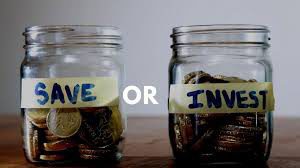How can you save if you desire to invest? Is it the question that’s been haunting you for some time? That you should invest money in a fixed deposit or save up in a bank account? Sit back and pause as this write-up will help you get a clear picture.
Wondering whether to start saving or investing? The answer to the question depends on what your goals in life are and your current financial status.

What’s the difference between Saving and Investing?
- Saving
Saving is keeping aside more money out of your income or earning, month by month. People generally save for a holiday, a home deposit or to pitch in for an emergency. As a result, saving denotes putting the money into a saving account.
- Investing
Investing is when you take out some money out of your saving and make it grow by purchasing financial products. Investment has many plans such as the FD fixed deposit, mutual funds and more.
Who should Save?
- For setting up an emergency fund
Everyone should take all pains and ensure to create decent emergency funds. You should save enough to last at least three months when you don’t have a good job. The fund should include rent, school fees for children, groceries and any other outgoings.
- Keep the saving on
Now that your crisis fund is active, you can still keep saving at least 10% of your income or more as per your affordability every month. You can get serious with this if you set some specific goals to achieve such as a small family trip, deposit for a room rent and more.
This is the time when you can start thinking of making some small investments of your savings.
When should not you Save?
There is a time when you should not be saving or investing either when you have more vital things up on your sleeves you can do with your wealth.
Are you ready to Kick off Investing?
Investment of money can help you grow your savings, but only some people can do it because it requires a lot of patience.
- Short-term investments
For your short-term investment, you can either let your saved money stay in your bank’s saving account or invest in a recurring deposit with a bank.
Yes, a recurring deposit or an RD is a smart investment plan where you don’t need much amount to invest.
You can open an RD account with your bank with only Rs.500 and earn around 6-7.5% interest rates depending on your tenor.
The longer the tenor and the investment amount, the bigger the interest payout on the maturity of the plan.
Mutual funds also have a minimum Rs.500/month investment requirement which you can opt for if you are eyeing to make decent profits (8-9%) in less time. However, the gains of a mutual fund are not guaranteed because it’s variable and governed by market conditions.
- Long-term investments
FD fixed deposit is a long-term investment option which requires at least 36 months and maximum 60 months. You can invest a minimum Rs.25,000 and earn around 8.10% FD interest rates as per your membership status with an online lender.
You can also save up to Rs.3,00,000 (tax saving fixed deposit) under section 80C of the Income Tax Act.
Have more money? You can invest in stocks, SIPs, gold, bonds and real estate to get fabulous returns. Investment, be it a short-term or a long-term depends on the affordability of a person.
Take expert Advice and Stay Safe
If you don’t have much idea about the saving and investing options or which channels to go first, you can always take the assistance of reputed financial consultants. When you implement their advice, your money will be safe, and it will grow as well.
The Bottom Line
Now that you know saving and investing are related to each other. It is ultimately your take to go which way and see your money grow, bit by bit. What would you like to do? Save the wealth in a saving account or open a fixed deposit and let it earn some more money? Make your decision wisely!










Comments are closed.